Economy
Struggling Intel names industry veteran Lip-Bu Tan as CEO
NEW YORK

Intel, the U.S. computer chipmaker struggling to catch up in the AI race, has announced tech industry veteran Lip-Bu Tan as its new chief executive.
class=”cf”>
Tan told the Intel team his focus would be on engineering, saying it “won’t be easy” to overcome challenges faced by the company.
Tan will start as Intel chief on March 18, according to the company.
Intel is one of Silicon Valley’s most iconic companies, but its fortunes have been eclipsed by Asian powerhouses TSMC and Samsung, which dominate the made-to-order semiconductor business.
The company was also caught by surprise with the emergence of Nvidia, a graphics chip maker, as the world’s preeminent AI chip provider.
Nvidia’s strength is in chips for powering AI, which are coveted by tech companies competing in that technology.
Intel’s niche has been in chips used in traditional computing processes being eclipsed by the AI rage.
Former U.S. president Joe Biden’s administration last year finalized a $7.9 billion award to Intel as part of an effort to bring semiconductor production to U.S. shores.
class=”cf”>
But Intel in February extended the timeline for completing two new fabrication plants in Ohio, saying it is taking a prudent approach to the $28 billion project.
For the full year 2024, Intel recorded a net loss of $18.8 billion as the U.S. chip giant continues to struggle to stake its place in the artificial intelligence revolution.
In Europe, Intel late last year said it was delaying its plans to build two mega chip-making factories in Germany and Poland as the company faces lower demand than anticipated.
Intel also said at the time that it would pull back on its projects in Malaysia.
Economy
Facing US tariffs, South Africa steps toward trade deal with China
China and South Africa inked a framework agreement for a new trade deal on Friday as Africa’s leading economy increasingly weighs other options following the steep import tariffs imposed on it by the U.S. and its diplomatic fallout with the Trump administration.
South Africa’s Ministry of Trade and Industry said the agreement would start negotiations over a deal that would give some South African goods, such as fruit, duty-free access to the Chinese market. The ministry said it expected the trade deal to be finalized by the end of March.
In return, the trade ministry said China will get enhanced investment opportunities in South Africa, where its car sales have seen rapid growth.
The U.S. slapped 30% duties on some South African goods under U.S. President Donald Trump’s reciprocal tariffs policy, one of the higher rates applied across the world. South Africa has said it is still negotiating with the U.S. for a better deal.
The China-South Africa deal follows others looking for alternatives to U.S. partnership in the face of Trump’s aggressive trade policies.
The announcement on the negotiations between China and South Africa came days after Trump issued a short-term renewal of a longstanding free-trade agreement between the U.S. and African nations. The U.S. extended the African Growth and Opportunity Act, which South Africa is a major beneficiary of, just until the end of the year and indicated it would be modified to fit the administration’s America First policy.
China is already South Africa’s largest trade partner for both imports and exports, while Chinese economic influence across the African continent continues to grow and it dominates in the extraction of Africa’s critical minerals that are key components for new high-tech products.
“South Africa looks forward to working with China in a friendly, pragmatic and flexible manner,” the trade ministry said.
Trade and Industry Minister Parks Tau, who traveled to China to sign the agreement, said the deal would benefit South Africa’s mining, agriculture, renewable energy and technology sectors.
U.S.-South Africa diplomatic ties have plunged to their worst point in decades after the Trump administration accused South Africa of pursuing an anti-American foreign policy and allowing the violent persecution of a white minority group at home. South Africa’s government has denied allegations that white Afrikaner farmers are being killed in a widespread effort to seize their land as baseless.
Trump has also barred South Africa from taking part in meetings of the Group of 20 rich and developing nations this year in the U.S.
South Africa’s biggest exports to China are gold, iron ore and platinum-group metals, while Chinese cars have quickly grown their market share in South Africa. Industry groups estimate Chinese brands have grown from around 2.8% of the South African market in 2020 to between 11% and 15% last year.
China’s BYD overtook Elon Musk’s Tesla in 2025 as the world’s biggest electric vehicle maker.
Economy
Ukrainian businesses struggle to stay afloat amid ongoing power cuts
It is early in the morning in the historic Podil district of Ukraine’s capital, Kyiv, and warm light from the Spelta bakery-bistro’s window pierces the darkness outside. On a wooden surface dusted with flour, the baker Oleksandr Kutsenko carefully divides and shapes soft, damp pieces of dough. As he places the first loaves into the oven, a sweet, delicate aroma of fresh bread fills the space.
Seconds later, the lights go out, the ovens switch off, and darkness envelops the room.
Kutsenko, 31, steps outside into the freezing night, switches on a large rectangular generator and the power kicks back in. It’s a pattern that will be repeated many times as the business struggles to keep working through the power outages caused by Russia’s bombing campaign on Ukraine’s energy grid.
“It’s now more than impossible to imagine a Ukrainian business operating without a generator,” said Olha Hrynchuk, the co-founder and head baker of Spelta.
The cost of purchasing and operating generators to overcome power outages is just one of many challenges facing Ukrainian businesses after nearly four years of war. Acute labor shortages due to mobilization and war-related migration, security risks, declining purchasing power and complicated logistics add to the pressure, officials say.
Hrynchuk, 28, opened the bakery 10 months after Russia launched its full-scale invasion in 2022. That winter was the first year Russia targeted Ukraine’s energy system. Hrynchuk says they barely know what it is to work under “normal” conditions, but have never faced the challenges they do now.
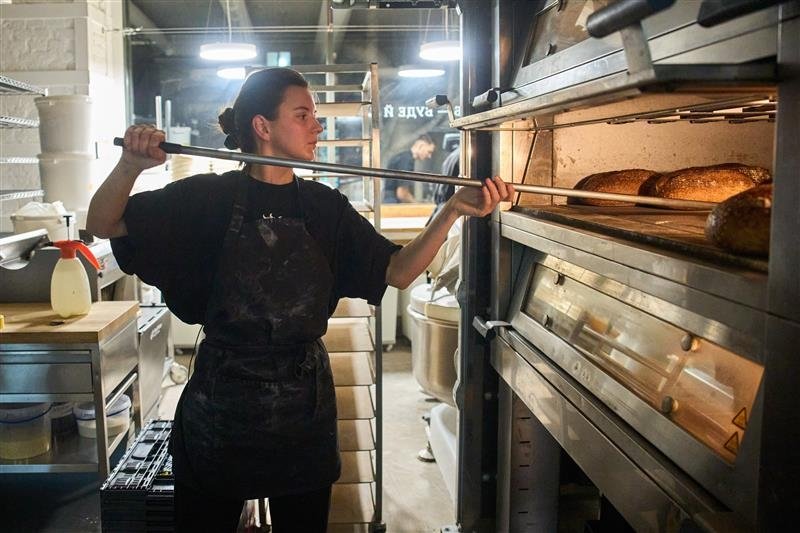
on a generator during a blackout caused by Russia’s regular air attacks
on the country’s energy system, Kyiv, Ukraine, Jan. 30, 2026. (AP Photo)
Production is entirely dependent on electricity and the generator burns about 700 hryvnias ($16) worth of fuel per hour.
Hard times
“We run on a generator for 10 to 12 hours a day. You have no fixed schedule, you have to adapt and refuel it at the same time,” Hrynchuk said.
Olha Nasonova, 52, who is head of the Restaurants of Ukraine analytical center, says the industry is experiencing its most difficult period of the past 20 years.
While businesses were prepared for electricity cuts, no one expected such a cold winter and it’s been especially tough for small cafes and family-run establishments, because they have the least financial resources.
The “Best Way to Cup” project, which has two venues and roasts and grinds its own coffee, is on the brink of permanent closure. Co-founder Yana Bilym, 33, who opened the cafe in May, said a Russian attack shattered all its windows and glass doors in August. Bilym said the cost of renovation was 150,000 hryvnias (about $3,400), half of which she financed with a bank loan that she only recently finished repaying.
Last month, after several consecutive large-scale Russian attacks on the energy sector, her entire building lost its water supply, and soon after, the sewer system stopped working.
“We were forced to close. We believe it’s temporary. Businesses in December and January, unfortunately, operate at a loss,” Bilym said.
Now she has to regularly check the coffee machine and the specialty refrigerators, which she fears may not withstand the cold. Bilym hopes the closure is short-term. Her husband volunteered to serve in the military on the front line and she wants him to have somewhere to come back to when he returns to civilian life.
Many businesses have become a lifeline for communities struggling with plunging temperatures. Ukraine’s government has allowed some firms to operate during curfew hours in the energy emergency as “Points of Invincibility,” allowing access to free electricity to charge phones and power banks, drink tea and have some respite from the cold.
Tetiana Abramova, 61, is a founder of the Rito Group, a clothing company that has been producing designer knitwear for men and women since 1991, the year Ukraine became independent.
It participates in Ukraine Fashion Week, the country’s biggest fashion show, and exports garments to the United States. Abramova took out a loan in 2022 to purchase a powerful 35-kilowatt generator costing 500,000 hryvnias ($11,500) to keep the business running during blackouts and a wood-fired boiler for heating.
“At work we have heat, we have water, we have light, and we have each other,” she said.
But it’s not easy. Operating on generators is 15%-20% more expensive than using regular electricity. As a result, production costs are currently about 15% higher than normal. Added to that, customer numbers have dropped by about 40% as many people have left the country, so the focus is now on attracting new clients through online sales.
“Profitability has fallen by around 50%, partly due to power outages,” she said. “This affects both the volume and efficiency of our work. We simply cannot operate as much as we used to.”
A macroeconomic forecast by the Kyiv School of Economics for the first quarter of 2026 says strikes on the energy system are currently the most acute short-term risk to the country’s gross domestic product (GDP).
The analysis suggested that if business manages to adapt, output losses could be limited to around 1% or 2% of GDP. But if the energy system failures are prolonged, it could lead to larger losses, as much as 2% or 3% of GDP.
Abramova, an entrepreneur with more than 30 years of experience, says she spent nearly 100,000 hryvnias ($2,300) over two months on generator servicing to maintain production. But she cannot pass all those costs on to retailers.
“For us now, the main goal is not to be the most efficient, but to survive,” Abramova said.
Economy
Indian farmers concerned after preliminary trade deal with US
Indian farmers have raised concerns that New Delhi has made too many concessions to Washington after the two countries reached a new interim trade deal that would notably lower tariffs following last year’s tensions.
Under the terms of the deal that was laid out in a joint statement from both countries released on Saturday, India will “eliminate or reduce tariffs on all U.S. industrial goods” and other food and agricultural products.
Meanwhile, the U.S. will apply a reciprocal tariff rate of 18% on goods from India, including textiles and apparel, leather and footwear, plastic and rubber, organic chemicals, and certain machinery, the joint statement added.
The terms were released after U.S. President Donald Trump announced a trade deal with India, stating that India’s Prime Minister Narendra Modi had promised to halt Russian oil purchases.
Modi lauded the new trade deal in a post on the social media platform X later on Saturday, saying it would open up opportunities and generate jobs.
But Indian farmer unions weren’t convinced, calling the deal a “total surrender” to American agricultural giants.
“Indian industry, agriculture … are now under grave threat of cheap imports that will be dumped into Indian markets,” the Samyukt Kisan Morcha (SKM), a coalition of multiple farmers’ unions, said in a statement following the announcement.
The group also called on farmers to join a nationwide protest on Feb. 12.
What’s on the table?
The joint statement states that India will “eliminate or reduce” tariffs on a “wide range of U.S. food and agricultural products.”
This includes tree nuts, some fresh fruit, soybean oil, wine, spirits and other “additional products” that were not specified.
Siraj Hussain, a former Agriculture Ministry top official, said Indian consumers were purchasing more nuts, “so it’s import may not have much impact on local production,” and will help satisfy high demand.
Domestic growers do worry, however, about cheap imports on other items such as apples, which they believe could have dire impacts on local producers.
“Import of fresh fruits such as apples … will ruin the farmers,” SKM said.
Officials hope safeguards included in the agreement, such as import quotas or minimum import prices for commodities including apples, will reduce the impact of foreign competition.
New Delhi’s promise of lower duties on dried distillers’ grains and red sorghum for animal feed could also reduce the need for local soybean meal.
Opposition lawmaker Jairam Ramesh said the move to ease imports of dried distillers’ grains and soybean oil would hurt “millions of soybean farmers” in key Indian states such as Maharashtra and Madhya Pradesh.
What’s off the table?
To stem concerns, Indian Trade Minister Piyush Goyal reassured farmers that their interests would be safeguarded, adding that the key red lines that had been drawn by New Delhi had not been crossed.
He said “no concessions” had been extended in “sensitive areas” such as grains, spices, dairy, poultry, meat and several vegetables and fruits, including potatoes, oranges and strawberries.
The trade minister also said genetically modified crops were not part of the agreement.
This includes GM soybean, which the U.S. has searched hard to find new markets for.
Small farms ‘can’t compete’
While the farm sector contributes just 16% to India’s gross domestic product (GDP), it provides livelihood to over 45% of the population.
This makes the industry a key voting bloc often wooed by political parties. Farmer groups have also shown, on multiple occasions, that they are a street force to be reckoned with.
In 2021, the government abandoned plans to reform the sector after months of intense protests that blocked the national capital’s highways and led to Delhi’s historic Red Fort complex being stormed by tractors.
“Indian farms are very small, and they can’t really compete with highly subsidised U.S. agriculture,” Hussain, the former agriculture ministry official, said.
India-U.S. trade
Between January and November 2025, when New Delhi was negotiating with Washington, Indian imports of American agricultural goods rose 34% year-over-year, raking in just under $2.9 billion.
Top imports included cotton, soybean oil, ethanol and various nuts such as almonds. This happened even before the trade deal, although the rise is partly due to India reducing tariffs on some of these U.S. items.
Experts have said that a further reduction in duties for products such as soybean oil, which was announced in the joint statement, will likely lead to a jump in goods being imported by India from the U.S.
Economy
Third Türkiye-China Business Conference held in Istanbul
The third Türkiye-China Business Conference took place in Istanbul on Saturday, hosting business community representatives from both countries and businesspeople.
According to Trade Minister Ömer Bolat, the conference was attended by Ren Hongbin, chairperson of the China Council for the Promotion of International Trade (CCPIT), along with representatives of the business communities of both countries and a large delegation of businesspeople.
“As Türkiye and China enter the 55th year of their diplomatic relations, our expectation from this important meeting is that these contacts will turn into concrete partnerships, new investments, and agreements that enhance the quality of mutual trade,” he wrote on the Turkish social media NSosyal.
Bolat expressed the hope that the conference would help generate new opportunities and lasting cooperation for the business communities of both countries.
Chinese Ambassador to Türkiye Jiang Xuebin said the event was important for exchanging views on advancing economic and trade relations between the two countries.
Recalling Chinese President Xi Jinping’s initiatives on global development, global security, global civilization, and global governance, Xuebin said these initiatives “offer ideas for advancing a more open, inclusive, equitable, balanced, and win-win path of development.”
China is Türkiye’s largest trading partner, said Xuebin at the event, adding that Chinese companies operating in Türkiye actively contribute to the country’s economic and social development through employment and tax revenues.
Wang Kang, vice president of the Export-Import Bank of China, said Türkiye is China’s fourth-largest trading partner in West Asia and its third-largest export market, while China is Türkiye’s second-largest trading partner overall and its largest source of imports.
He noted that Türkiye is among China’s top five investment destinations in West Asia.
“As a bank that plays a role in supporting overseas investment and development, we attach great importance to cooperation with Türkiye,” he concluded.
Economy
US states woo Turkish investors with low-cost energy pitch
U.S. state representatives are working to woo Turkish investors by emphasizing access to low-cost, uninterrupted energy, while seeking to expand cooperation across sectors including energy, chemicals, metals, electronics, aviation and industrial manufacturing.
The outreach took place during the 2026 SelectUSA Roadshow, a U.S. federal government initiative designed to promote foreign direct investment and economic development. Events were held in Istanbul, Kocaeli and Ankara, bringing together Turkish companies and representatives from several U.S. states.
Nathan Lord, president of Shale Crescent USA, said the organization is focused on attracting industrial investment to the shale gas basin covering Ohio, Pennsylvania and West Virginia by highlighting the region’s energy advantage.
Speaking to Anadolu Agency (AA), Lord said energy is one of the largest cost components for heavy industry and that the region offers reliable and affordable power for sectors such as rubber, glass, automotive, steel and petrochemicals.
“If Ohio, West Virginia and Pennsylvania were a country, they would be the world’s third-largest natural gas producer after the rest of the U.S. and Russia,” he said. “The cheapest natural gas and electricity in the U.S. are found in the Shale Crescent USA region. This provides unmatched profitability and supply security for energy-intensive manufacturing.”
Lord said continuous energy supply and favorable market conditions give the region a competitive edge for international investors.
He recalled a conversation with an executive from a multinational company investing in the area. “I’ve built facilities all over the world and always had to choose between being close to energy or close to customers. This is the first place where I don’t have to make that choice, both are here,” Lord said.
“Following our meetings in Türkiye, we believe dozens of Turkish companies will invest in our region,” he added.
‘Europeans talk, but Turks do’
Greg Kozera, marketing director of Shale Crescent USA, said the discovery of shale gas in Ohio, West Virginia and Pennsylvania has sharply increased the region’s attractiveness for foreign investment.
He said abundant, low-cost energy has fueled a revival in manufacturing, particularly in steel and petrochemicals.
Kozera also highlighted the role of infrastructure, praising Türkiye’s ability to complete large-scale projects quickly.
“During my time in Türkiye, I learned how quickly infrastructure investments are completed here. We can’t do that in the U.S.,” he said.
“My advice to Turkish companies is this: If you are a high-energy user, find the energy first. The closer you are to the energy source, the higher your long-term profitability,” he added.
Comparing business environments, Kozera said his recent visits to Türkiye and Europe revealed stark differences.
“Europeans talk, but Turks do,” he said. “Investors in Türkiye are not blocked by the government – they are encouraged. I saw new industrial zones rising along the Istanbul-Ankara corridor. In Europe, facilities are closing.”
“I don’t know what’s happening politically, but what I see is this: Good things are happening here, Europe is struggling, and this is a major opportunity for Türkiye to assume a real leadership role in Europe,” he said.
Economy
Türkiye vows to maintain tight monetary policy, fiscal discipline
Türkiye will maintain its tight monetary policy and keep fiscal discipline to further lower inflation, Vice President Cevdet Yılmaz pledged on Saturday.
Turkish annual consumer price inflation eased to 30.65% in January, official data showed earlier this month, thus continuing a downward momentum observed since the middle of 2024, when it stood at over 70%. It is at the lowest level since late 2021.
However, month-over-month inflation advanced by a higher-than-expected 4.84% in January, driven in part by new year price adjustments and a jump in prices of food and nonalcoholic drinks.
Speaking at an event in the southeastern province of Siirt, Yılmaz said the 45-point fall in inflation since May 2024 was not enough, adding the government was on a path to further lower consumer prices.
“We will maintain our tight monetary policy, and we will keep our disciplined fiscal policies. We are determined to do this. But these are not enough either,” he said.
“On the other hand, we have to contribute to our battle with inflation through our supply-side policies,” he added.
“We believe supply-side policies are very important, both in terms of our macroeconomic policies and in general. In May 2024, inflation was at 75.5%. It recently fell to 30.6%, a decrease of approximately 45 percentage points. Is that enough? No. We want it to fall even further. That is our direction,” Yılmaz asserted.
Supply-side policies
The officials have often underscored the importance of supply-side policies as part of the strategy to lower cost pressures. The government has, in recent months, launched a large social housing project in this regard.
This view was re-emphasized by the vice president on Saturday.
“We have five critical areas here. First, food; second, social housing; third, energy; fourth, logistics; and fifth, human resources. We believe that supply-side policies in these five areas will make significant contributions to both our fight against inflation and our balanced and sustainable growth,” he said.
Moreover, he highlighted the importance of prioritizing projects and finishing them before new ones are launched.
“That’s why we prioritized irrigation projects, especially those that have reached the stage of being completed in the fields. The dam is finished, the main canal is largely completed, only the field work remains. We said, ‘Let’s focus on those.’ We wouldn’t be doing the right thing if we distributed our money to new projects and continued before all the projects were finished. We need to prioritize them,” he suggested.
Yılmaz’s remarks were directed at the development process in Siirt and the wider region, which, in the past, has been long riddled and associated with terror.
“Region 6 incentives are very important. We provided very strong support, especially to labor-intensive sectors,” he said, referring to the southeast region.
“In this sense, we supported this with very strong incentives. We continue the same approach today. If the textile and garment industry has developed and reached these levels in the east and southeast, it is thanks to these incentives,” he suggested.
At the same time, apart from public investments, which Yılmaz said were “very important,” he also pointed out that “private sector investments are just as important.”
Tight policy stance
Turkish authorities have been pursuing a tighter monetary approach since the elections in 2023 to tackle the runaway prices. The central bank has raised interest rates from 8.5% to 50% at one point, but has then turned to easing as inflation pressures began to ease.
Last month, the Central Bank of the Republic of Türkiye (CBRT) lowered its key interest rate by a less-than-expected 100 basis points to 37%, citing firming inflation, pricing behavior and expectations that threaten the disinflation process.
After a brief policy reversal early last year, the bank’s rate-cutting cycle resumed in July with a 300-basis-point cut, followed by more subsequent cuts.
The bank has eased by 1,300 points since 2024, when it held rates at 50% for most of the year to anchor inflation expectations.
The CBRT expects inflation to fall to its 16% interim target by the end of 2026, with a projected range of 13%-19%. Markets will closely follow the first inflation report of the year that the bank is scheduled to present this Thursday.
-

 Daily Agenda2 days ago
Daily Agenda2 days agoHistorical blow from MİT to Mossad: Trade-masked assassination network collapsed
-

 Daily Agenda3 days ago
Daily Agenda3 days agoConsecutive posts from politicians on the third anniversary of the disaster of the century!
-
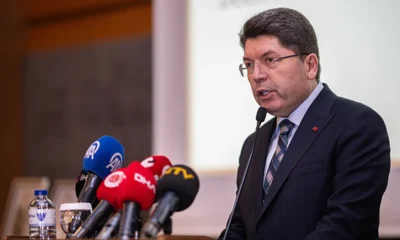
 Daily Agenda9 hours ago
Daily Agenda9 hours agoMinister of Justice Tunç: “The regulation regarding children involved in crime will come to the parliament after the commission works are completed.”
-

 Sports9 hours ago
Sports9 hours agoTurkish center Alperen Şengün named in 2026 NBA All-Star
-

 Sports3 days ago
Sports3 days agoTurkish football’s love for ‘African’ brilliance could finally pay off
-
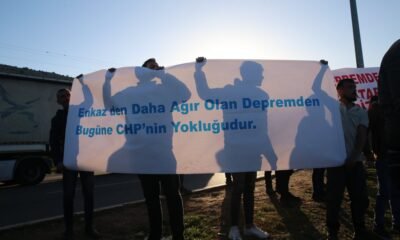
 Politics3 days ago
Politics3 days agoProtests, low turnout spoil CHP chair’s visit to Turkish quake zone
-
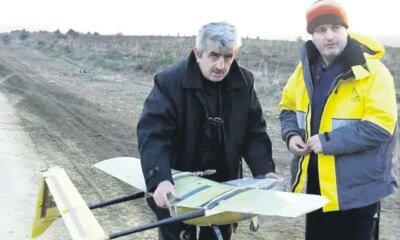
 Daily Agenda23 hours ago
Daily Agenda23 hours agoA Akıncı passed from this world
-
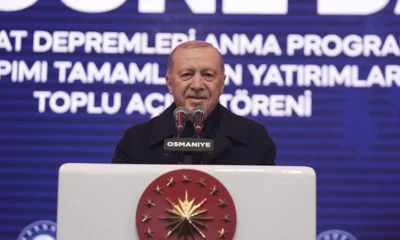
 Daily Agenda3 days ago
Daily Agenda3 days agoBreaking news! President Erdoğan spoke in Osmaniye on February 6: We were reborn to 86 million people, we showed the power of Türkiye!




